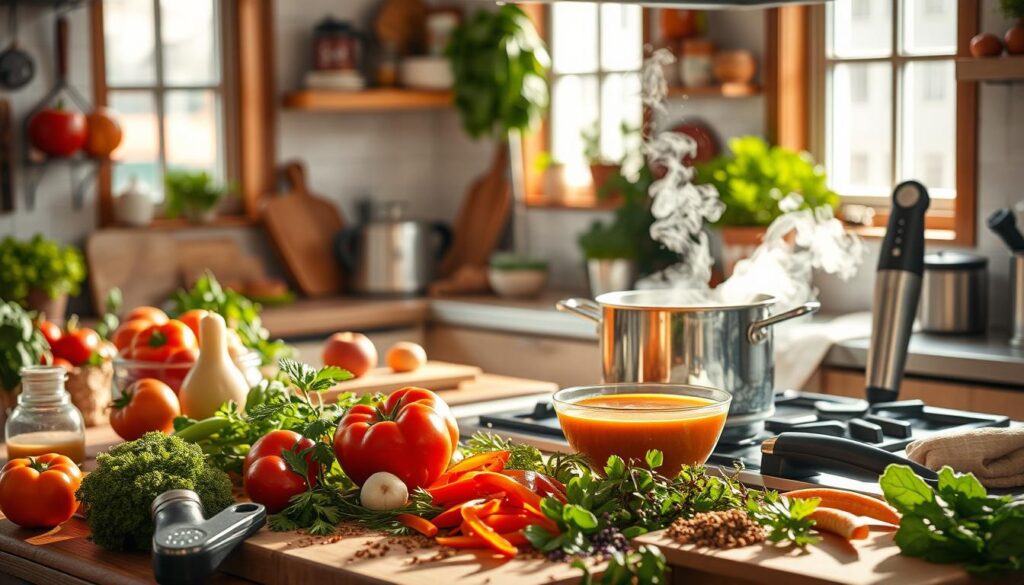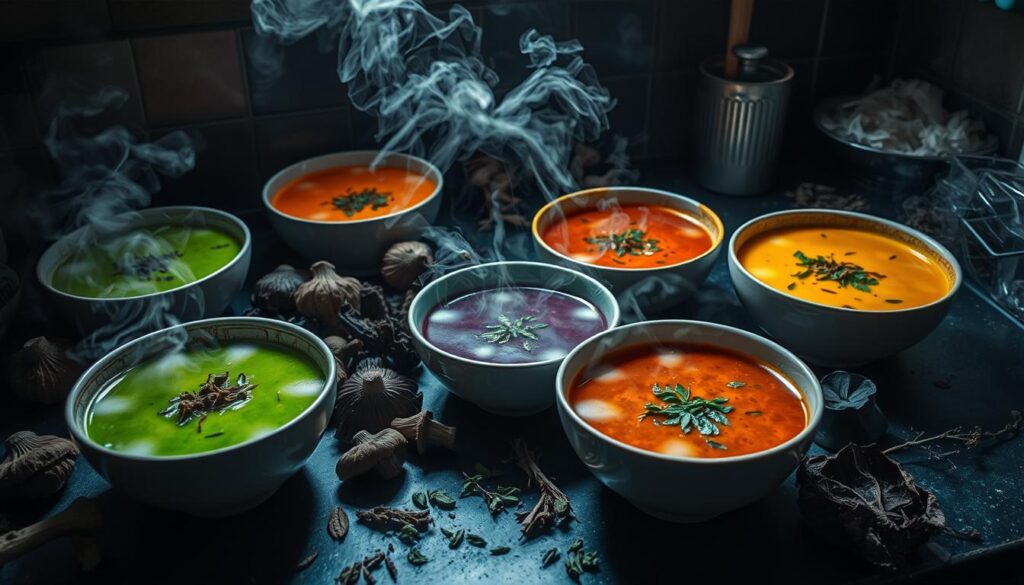Whether you’re a pro in the kitchen or new, learning to make soups in Abiotic Factor can change the game. It’s key for survival and success.
In Abiotic Factor, you can find soups like Hearty Stews and Creamy Tomato Bisques. These soups use plant-based ingredients and have unique tastes. By understanding how the environment affects your cooking, you can get the most out of these soups.
Understanding the Basics of Cooking in Abiotic Factor
In Abiotic Factor, sustainable cooking is key to survival. You need to know the dietary preferences and cooking basics. This knowledge is crucial for success in this tough environment.
Essential Cooking Requirements
To cook, you’ll need some basic items. First, get a Portable Stove. You can make it with 2x Coil, 4x Plastic Scrap, 4x Metal Pipe, and 1x Keyboard. Also, you’ll need a Soup Bowl. It’s made from 1x Metal Scrap, 1x Stapler, 1x Glass Scrap, and 1x Test Tube.
For ingredients, look for meats, veggies, and spices in the game world. Remember to collect water too. It’s vital for culinary technique.
Required Cooking Level and Equipment
| Cooking Requirement | Details |
|---|---|
| Cooking Level | Level 3 |
| Portable Stove | Crafted from 2x Coil, 4x Plastic Scrap, 4x Metal Pipe, 1x Keyboard |
| Soup Bowl | Crafted from 1x Metal Scrap, 1x Stapler, 1x Glass Scrap, 1x Test Tube |
Basic Ingredients Collection
- Various meats (e.g., Raw Peccary Chop, Raw Alien Drumstick, Raw Alien Rump)
- Diverse vegetables (e.g., Super Tomato, Potato, Anteverse Wheat)
- Assorted seasonings and extras (e.g., Salt, Milk Sac, Carbuncle Mushroom)
With the right tools and ingredients, you’re ready to cook. You’ll master sustainable cooking and culinary techniques in Abiotic Factor.
Getting Started with Soup Making Equipment
Making tasty soup recipes in Abiotic Factor needs the right tools. Before starting, let’s look at the key items for making healthy and sustainable cooking dishes.
The first thing you need is a pot. You can find pots in kitchens or make them with Staplers and Metal Scrap at a Crafting Bench. These pots can be used on stoves. But, remember to empty them before leaving to keep your soup from disappearing.
You also need a Cooking Skill of at least 3 (Soupsmith) to make soup. You can boost this skill by eating certain foods or talking to NPCs. The better your Cooking Skill, the tastier your soups will be.
Beneficial Soup Recipes Abiotic Factor and Their Effects
Making the right soup recipes can bring many benefits in the world of Abiotic Factor. There are soups that help you recover and others that give you buffs. Let’s look at the best soup recipes and how they help.
Recovery-Based Soups
Sustenance Soup is a great example of a recovery soup. It gives you the Quick Reflexes effect. This boosts your Accuracy and Reloading XP gain. It’s great for getting better in combat and moving forward faster.
Buff-Providing Recipes
Some soups in Abiotic Factor give you buffs. Meaty Stew, for example, gives you the Heightened Senses effect. This helps your Blunt and Sharp Melee XP gain. Pest Goulash gives you the Souper Satisfied effect. It makes you less thirsty and hungry.
XP-Boosting Soups
Some soups boost XP in specific areas. Veggie Stew, for instance, increases your Agriculture XP. Sweet Porridge boosts the sustenance you get from vending machines. These soups are key for growing your character.
Knowing about the different soup recipes and their effects helps players. They can use their cooking skills to improve their Abiotic Factor experience. This includes recovery, buffs, and XP gains.
Advanced Cooking Techniques and Ingredient Combinations
Dive into the world of cooking in Abiotic Factor. Learn about advanced techniques and flavor profiles. Players can find new ways to cook by using plant-based ingredients.
Try mixing Exor Heart, Carbunkle Mushroom, and Super Tomato. This can lead to new recipes and interesting effects. Mastering these culinary techniques can help you make soups like A&L Mega Stew or Balanced Stew.
Explore the game’s mechanics and flavor profiles to find out about Hearty Stew. It makes your inventory lighter by 25%. The virtual kitchen of Abiotic Factor is full of possibilities.

Remember, mastering advanced cooking takes an open mind and a willingness to try new things. Enjoy the journey of discovery in Abiotic Factor. You’ll find new recipes and their benefits.
Understanding Soup Effects and Player Benefits
In the world of Abiotic Factor, soups offer many temporary buffs and boosts. These can greatly improve a player’s experience and chances of survival. They are key to overcoming the game’s tough challenges.
Temporary Buffs and Boosts
Some soups give players valuable temporary effects. For example:
- Lightfooted – Increases Sprinting and Sneaking XP
- Souper Satisfied – Slows hunger and thirst
- Heightened Senses – Boosts Blunt and Sharp Melee XP
- Quick Reflexes – Increases Accuracy and Reloading XP
Some soups have special effects. Like Sugar High, which slows stamina drain but increases fatigue and bathroom needs.
Duration of Effects
The length of these effects varies. Knowing how long each buff lasts is key. It helps players plan and get the most out of their gameplay.
Stacking Possibilities
Some soup effects can stack with other bonuses. This can greatly enhance a player’s abilities. Trying different soup recipes and combinations can reveal powerful synergies. It adds a strategic layer to the game’s culinary system.
Exploring the many soup effects and their combinations opens up new ways to grow and survive in Abiotic Factor. Whether you want to boost your nutritional value, enhance your dietary preferences, or just enjoy a meal, understanding soups can change the game.
Harmful Soups and Their Consequences
In the world of Abiotic Factor, not all soups are good. Some can help, like making your environmental impact better or teaching you sustainable cooking. But others can be very bad for you.
One soup to stay away from is the Toxic Soup. It’s made from rotten food and chemicals. Eating it can make you very sick, causing you to throw up and feel really bad.
Another soup to avoid is the Poop Soup. It’s made from feces and other dirty things. It will make you sick and you’ll smell bad, too.
- Toxic Soup: Causes sickness and vomiting
- Poop Soup: Causes sickness and a foul odor
- Killer Soup: Results in immediate death
The worst soup is the Killer Soup. It’s made from glass and other dangerous things. If you eat it, you will die right away.
| Soup Type | Consequences |
|---|---|
| Toxic Soup | Sickness, Vomiting |
| Poop Soup | Sickness, Foul Odor |
| Killer Soup | Immediate Death |
To stay safe, choose your ingredients wisely and cook safely. Focus on environmental impact and sustainable cooking. This way, your food will help you, not hurt you.

Maximizing Nutritional Values and Survival Benefits
As an adventurer, knowing the nutritional value of soups is key. It helps you survive in harsh environments. By planning your meals, you keep hunger and thirst under control. This keeps your character nourished and hydrated on your journey.
Hunger and Thirst Management
Each soup recipe has its own hunger and thirst points. For example, Meaty Stew gives 40 hunger and 22 thirst points. On the other hand, Simple Tomato Soup offers 15 hunger and 35 thirst points. This lets you choose soups that meet your nutritional needs.
Strategic Meal Planning
Good meal planning balances soup nutritional value with desired effects. You might pick Sugary Slop for its Sugar High effect or Veggie Stew for Agriculture XP. This way, you get the most out of your meals, improving survival and performance in Abiotic Factor.
| Soup Recipe | Hunger Restoration | Thirst Restoration | Additional Effects |
|---|---|---|---|
| Meaty Stew | 40 | 22 | – |
| Simple Tomato Soup | 15 | 35 | – |
| Sugary Slop | 25 | 20 | Sugar High effect |
| Veggie Stew | 30 | 25 | Agriculture XP boost |
By understanding the nutritional value and effects of soups, you can survive better in Abiotic Factor. This knowledge helps you thrive in its challenges.
Environmental Factors Affecting Soup Preparation
Exploring Abiotic Factor means looking at how the environment affects your soup-making. Ingredients with high radiation levels can impact soup safety and effects. Also, what produce is in season can change your recipe choices, forcing you to adjust your cooking.
In Abiotic Factor, filled with alien plants and animals, picking ingredients carefully is key. The game’s world offers both challenges and chances. Knowing how these factors work together helps your meals nourish you and boost your survival and performance.
When making a healing broth or a soup to improve performance, think about the environmental impact, what produce is in season, and radiation risks. Adapting your soup-making to the changing environment helps you succeed in this unique world










